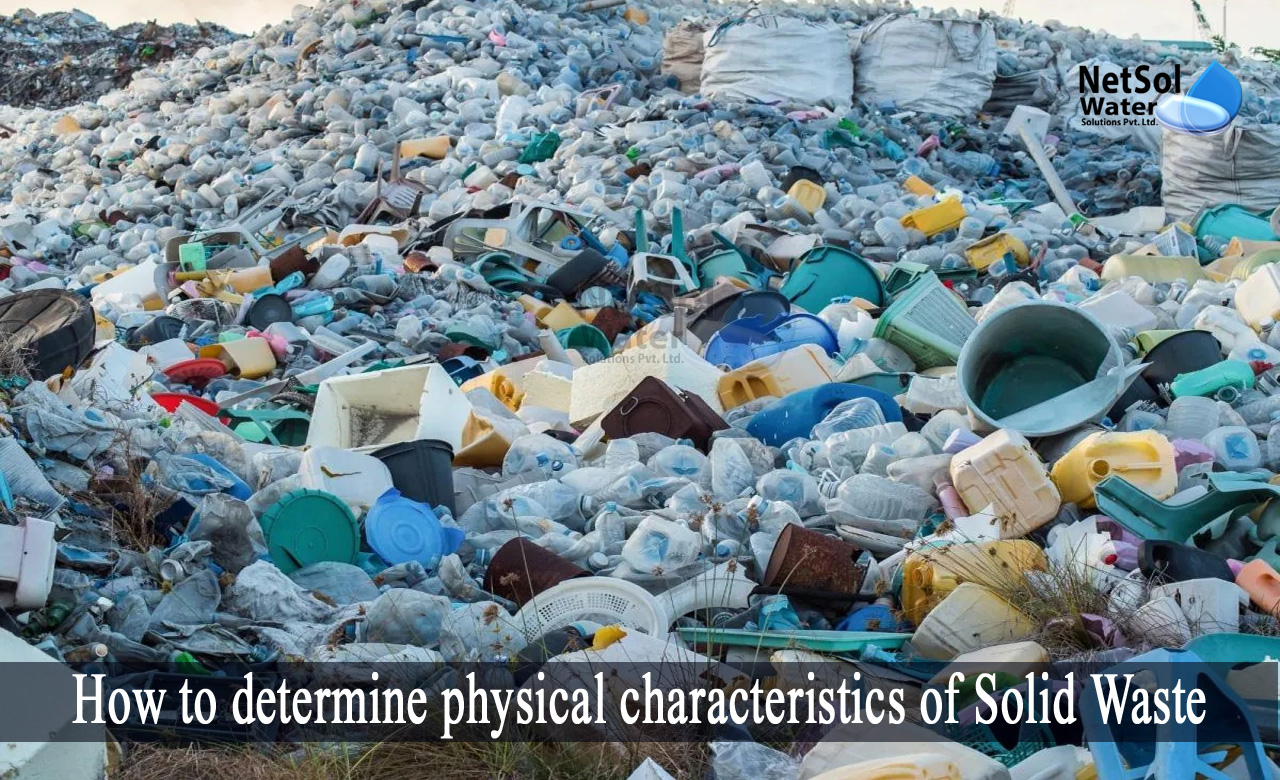How to determine physical characteristics of Solid Waste?
The physical makeup of solid wastes varies based on their sources and types. By virtue of the relative proportions of degradable and non-degradable components, the moisture content, and the particular nature of the bio-degradable element, the type of waste that is dumped in a landfill, will alter both the production of bulk gases and the composition of the leachate.
Determination of the physiological characteristics of solid waste
For the selection and use of equipment as well as the study and design of disposal facilities, information and data on the physical characteristics of solid wastes are crucial.
The following physical properties need to be thoroughly researched.
· Density
When designing a solid waste management system, such as the design of sanitary landfills, storage, types of collection and transport vehicles, etc., the density of the garbage, or its mass per unit volume (kg/m3), is an important consideration.
To put it simply, compaction of wastes to the ideal density is necessary for a landfill to operate efficiently. Any standard compaction tool may reduce waste volume by 75%, increasing the initial density from 100 kg/m3 to 400 kg/m3.
In other words, when waste is compacted, a waste collection vehicle may carry four times. As solid waste travels from its source to its disposal, its density fluctuates significantly due to scavenging, handling, weather-related wetting and drying, vibration in the collection vehicle, and decomposition.
· Moisture level
The weight of water (wet weight minus dry weight) divided by the total wet weight of the waste, is known as the moisture content.
Moisture makes solid wastes heavier, which raises the cost of collection and transportation. Additionally, moisture content is a key factor in determining whether waste treatment by incineration is economically feasible, because wet waste requires energy for the evaporation of water, and for raising the temperature of water vapour. Wastes should generally be protected from rain or other outside water.
Using the formula below, we can determine the moisture percentage.
Moisture content (%)= {Wet wt. – dry wt. / wet wt.} x 100
The usual moisture content range is 20 to 40%, which reflects the extremes of wastes in a desert climate, and during the wet season in an area with considerable precipitation. Values above 40%, however, are not unusual.
Aside from climatic factors, low-income countries typically have higher moisture content, due to the greater percentage of food and yard waste.
· Dimensions of waste components
Due to its significance in the design of mechanical separators, shredders, and waste treatment processes, the size distribution of waste elements in the waste stream is crucial. This varies greatly, hence it is important to properly analyse the waste characteristics, while developing a system.
· Calorie Content or calorific value
Calorific value, which is stated as kcal/kg, is the quantity of heat produced by the burning of a material, at a given unit weight. The calorific value is evaluated experimentally using Bomb calorimeter, in which the heat generated at a constant temperature of 25°C from the combustion of a dry sample, is measured.
The following physical characteristics must be considered while analysing waste dumped in landfills:
· Size of the field
The entire quantity of moisture that can be held in a waste sample, when it is subject to gravitational attraction, is the field capacity of municipal solid waste. It is a crucial step because leachate, which may be a significant issue in landfills, will form when there is more water than the area can hold. The amount of pressure applied and the level of waste breakdown, affects the field capacity.
· Hydraulic conductivity
An essential physical characteristic of compacted wastes is their hydraulic conductivity, which controls how liquids and gases travel throughout a landfill. The pore size distribution, surface area, and porosity of a solid substance, are all factors that affect permeability.
· Porosity
The percentage of voids in a material's total volume is known as porosity. Municipal solid waste has a porosity, which normally ranges from 0.40 to 0.67, depending on how compacted it is and what the waste is made of.
· Compressibility
It refers to how much pressure causes the filter cake or suspended particles to physically shift.
Netsol Water is Greater Noida-based leading water & wastewater treatment plant manufacturer. We are industry's most demanding company based on client review and work quality. We are known as best commercial RO plant manufacturers, industrial RO plant manufacturer, sewage treatment plant manufacturer, Water Softener Plant Manufacturers and effluent treatment plant manufacturers.
The other characteristics include-
· Colour
· Voids
· Shapeofcomponents
· Opticalproperty
· Magneticproperties,and
· Electricproperties.
Conclusion
Solid wastes are complex, multiphase mixtures, and it is difficult to determine their composition, because of their heterogeneous character. The majority of the time approaches based on random sample methods are utilized to determine composition, because statistical procedures are challenging. Therefore, it becomes important to determine physical as well as chemical characteristics of solid waste.
How can we assist?
Netsol Water offers you practical solutions for effective solid waste management. In order to manage solid waste, we manufacture a wide variety of solid waste recyclers, solid waste converters, green waste recyclers, food waste converters, and much more. Contact our experts today for additional information on how you can manage your solid waste.
Apart from this 24x7 customer support is our USP. Call on +91-9650608473, or write us at enquiry@netsolwater.com for any support, inquiry or product-purchase related query.



